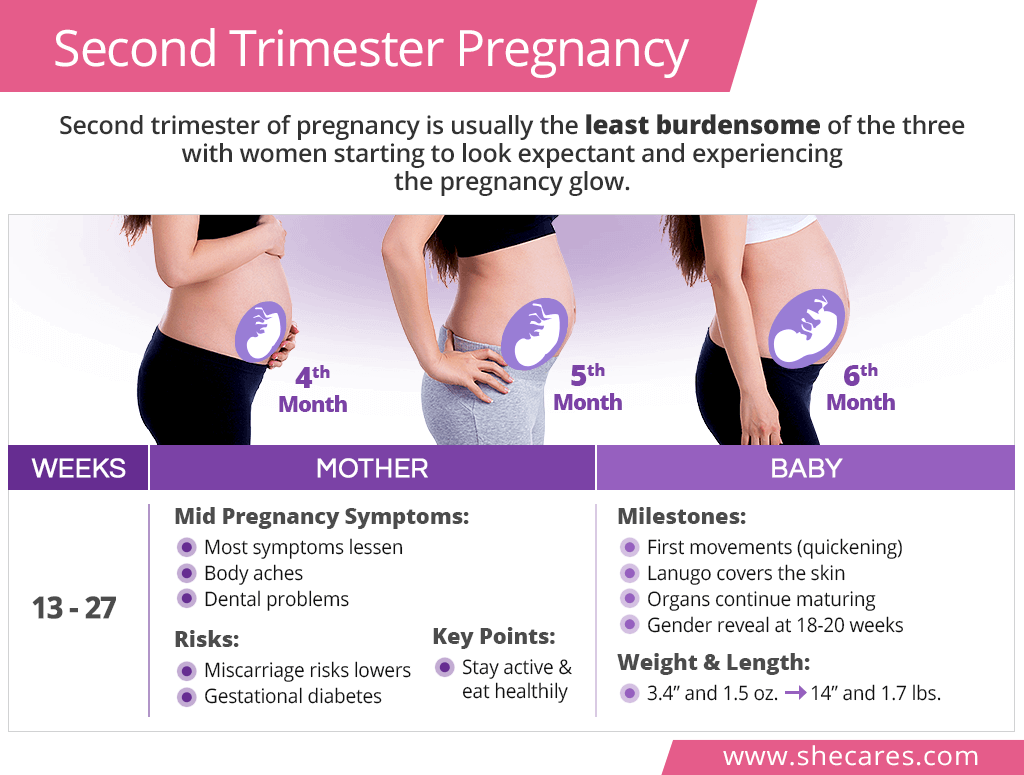
The Second Trimester of Pregnancy: A Journey of Growth and Change
The second trimester of pregnancy, spanning from week 13 to week 28, marks a period of significant physical, emotional, and fetal development. As the body adjusts to the growing fetus, a myriad of changes occur, paving the way for the baby’s continued growth and maturation.
Physical Changes
Uterus Expansion: The uterus undergoes a remarkable expansion during the second trimester. By week 20, it has grown to the size of a grapefruit and extends beyond the pubic bone. This expansion accommodates the rapidly growing fetus and the increasing volume of amniotic fluid.
Abdominal Enlargement: As the uterus expands, the abdomen becomes more prominent. The "baby bump" becomes increasingly noticeable, especially towards the end of the trimester.
Breast Changes: The breasts continue to enlarge and become more tender. Colostrum, the precursor to breast milk, may begin to leak from the nipples.
Weight Gain: Weight gain typically accelerates during the second trimester. The recommended weight gain is 1-2 pounds per week, totaling 10-15 pounds by the end of the trimester.
Skin Changes: The skin may become darker, especially in areas such as the nipples, areolas, and linea alba (the dark line that runs down the abdomen).
Varicose Veins: The increased blood volume and pressure can lead to the development of varicose veins, particularly in the legs.
Emotional Changes
Mood Swings: The second trimester is often characterized by mood swings. Hormonal fluctuations, coupled with the physical changes and anticipation of the baby’s arrival, can contribute to emotional ups and downs.
Increased Energy: Many women experience a surge in energy during the second trimester. This is due to the stabilization of hormone levels and the absence of early pregnancy symptoms like nausea and fatigue.
Nesting Instinct: As the due date approaches, some women may experience a strong urge to prepare the home for the baby’s arrival. This "nesting instinct" involves organizing, cleaning, and creating a comfortable environment for the newborn.
Fetal Development
Growth and Movement: The fetus undergoes rapid growth during the second trimester. By week 20, it weighs approximately 10 ounces and is about 6 inches long. The baby’s movements become more pronounced and frequent, and the mother may begin to feel kicks and flutters.
Organ Development: The fetus’s organs continue to develop and mature. The heart, brain, lungs, and digestive system become fully functional. The baby’s eyelids open, and the eyes begin to develop color.
Gender Determination: If desired, the baby’s gender can be determined through an ultrasound examination during the second trimester.
Health Monitoring
Prenatal Visits: Regular prenatal visits are essential during the second trimester. The healthcare provider will monitor the mother’s health, check the baby’s growth and development, and screen for any potential complications.
Ultrasound: An ultrasound examination can provide valuable information about the baby’s anatomy, growth, and well-being.
Blood Tests: Blood tests may be performed to check for anemia, gestational diabetes, and other health conditions.
Lifestyle Considerations
Nutrition: A healthy diet is crucial for the mother and baby’s well-being. Focus on consuming nutrient-rich foods, including fruits, vegetables, whole grains, and lean protein.
Exercise: Regular exercise is generally safe during the second trimester. Choose low-impact activities that do not put excessive strain on the body, such as walking, swimming, or yoga.
Sleep: Getting enough sleep is essential for the mother’s physical and emotional health. Aim for 7-9 hours of quality sleep each night.
Stress Management: Managing stress is important for both the mother and baby. Engage in activities that promote relaxation, such as meditation, prenatal massage, or spending time in nature.
Cautions
Bleeding or Cramping: Any vaginal bleeding or severe cramping should be reported to the healthcare provider immediately.
Excessive Weight Gain: Rapid or excessive weight gain can increase the risk of complications, such as gestational diabetes and preeclampsia.
Premature Labor: If contractions become regular or painful, it is important to seek medical attention promptly.
The second trimester of pregnancy is a time of remarkable transformation and growth. By understanding the physical, emotional, and fetal changes that occur during this period, women can make informed decisions about their health and well-being. Regular prenatal care, a healthy lifestyle, and emotional support are essential for a safe and fulfilling pregnancy journey.